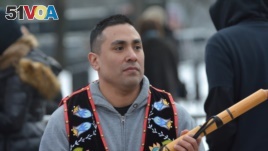18 February, 2019
Native American flute players perform at music festivals around the world. But few belong to any Native tribe or nation. That concerns award-winning flutist Darren Thompson. He is a member of the Lac du Flambeau Band of Lake Superior Chippewa in northern Wisconsin.
Thompson told VOA, "The Native American flute is the name of the instrument, so anybody who picks one up and plays it can call himself a Native American flute player."
This week, Thompson is performing at the National Museum of the American Indian (NMAI) in New York. He will share music and stories connected to the history and struggles of the Ojibwe people.
Playing an inauthentic flute violates the U.S. Indian Arts and Crafts Act. The law, passed in 1990, bans the sale of goods falsely identified as "Native American." But there is nothing to stop non-Native performers from falsely claiming Native American heritage.
Thompson said, "It's not so much the fact that they are playing the flute that bothers me. It's the fact that a lot of them are non-Native and try to play the part of a Native, wearing what they think is Indian attire..."
Thompson grew up hearing traditional Ojibwe music. But it was not an important part of his life until he left the reservation.

Ojibwe flutist Darren Thompson at the Indigenous Peoples March in Washington, D.C., Jan. 18, 2019. (Photo by Mike Garcia)
He said, "I went to Marquette University, where there weren't any other Native kids. I was still in Wisconsin, but it was a foreign environment."
His longing for home led Thompson to the music of Navajo/Ute flutist Raymond Carlos Nakai. Nakai's music brought back childhood memories.
"One of the first stories I ever heard came from the elders, who talked about trees," Thompson said. "I remember them saying trees sing to us and give us guidance. I think I was four, and that story came to mind 15 years later when I first heard Nakai playing."
Thompson bought his first flute from a non-Native seller at a cultural event. He taught himself to play. As he learned, he says he felt moved to connect to the music of his ancestors.
He added, "I went out to museums to research actual instruments that were seized 200 years ago and taken into collections."
Traditionally, players made their own instruments from a single piece of wood. No two instruments would have been exactly alike.
Thompson said, "The length of the instrument would be the distance from that person's armpit to his first knuckle. The width would be the same as the width of his thumb."
The number of open holes carved into the flute also differs. Thompson owns several flutes. He made a few of them himself. Some have only four holes, while others have five or six.
The result is a sound unique to each player — a deep and clear sound that Thompson says "touches a lot of people."
He has wanted to perform at NMAI for at least 10 years.
Thompson said, "NMAI has a program called ‘The Art of Storytelling.' My performance is unique, in that I try to reintroduce stories and music from history. Songs I've learned that were recorded in the early 1900s, before our culture got erased."
I'm Jonathan Evans.
Cecily Hilleary reported this story for VOA News. Jonathan Evans adapted it for Learning English. Caty Weaver was the editor.
________________________________________________________________
Words in This Story
inauthentic – adj. not real, accurate, or sincere; not authentic
elders – n. people who have authority because of age and experience
heritage – n. the traditions, achievements, beliefs, etc., that are part of the history of a group or nation
attire – n. clothing
erase(d) – v. to remove any thought or memory of something
reintroduce – v. to begin using something again
unique – adj. very special or unusual
actual – adj. real and not merely possible or imagined : existing in fact